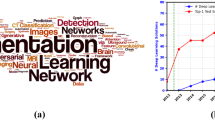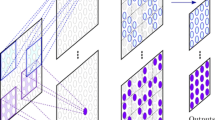Abstract
Fetal functional magnetic resonance imaging (fMRI) offers critical insight into the developing brain and could aid in predicting developmental outcomes. As the fetal brain is surrounded by heterogeneous tissue, it is not possible to use adult- or child-based segmentation toolboxes. Manually-segmented masks can be used to extract the fetal brain; however, this comes at significant time costs. Here, we present a new BIDS App for masking fetal fMRI, funcmasker-flex, that overcomes these issues with a robust 3D convolutional neural network (U-net) architecture implemented in an extensible and transparent Snakemake workflow. Open-access fetal fMRI data with manual brain masks from 159 fetuses (1103 total volumes) were used for training and testing the U-net model. We also tested generalizability of the model using 82 locally acquired functional scans from 19 fetuses, which included over 2300 manually segmented volumes. Dice metrics were used to compare performance of funcmasker-flex to the ground truth manually segmented volumes, and segmentations were consistently robust (all Dice metrics ≥ 0.74). The tool is freely available and can be applied to any BIDS dataset containing fetal bold sequences. Funcmasker-flex reduces the need for manual segmentation, even when applied to novel fetal functional datasets, resulting in significant time-cost savings for performing fetal fMRI analysis.






Similar content being viewed by others
References
Arroyo, M. S., Hopkin, R. J., Nagaraj, U. D., Kline-Fath, B., & Venkatesan, C. (2019). Fetal brain MRI findings and neonatal outcome of common diagnosis at a tertiary care center. Journal of Perinatology, 39(8), 1072–1077. https://doi.org/10.1038/s41372-019-0407-9
De Asis-Cruz (2022). FetalGAN: Automated Segmentation of Fetal Functional Brain MRI Using Deep Generative Adversarial Learning and Multi-Scale 3D U-Net. Front. Neurosci., 07 June 2022. Sec. Brain Imaging Methods. Volume 16– https://doi.org/10.3389/fnins.2022.887634
Esteban, O., Markiewicz, C. J., Blair, R. W., Moodie, C. A., Isik, A. I., Erramuzpe, A., Kent, J. D., Goncalves, M., DuPre, E., Snyder, M., Oya, H., Ghosh, S. S., Wright, J., Durnez, J., Poldrack, R. A., & Gorgolewski, K. J. (2019). fMRIPrep: A robust preprocessing pipeline for functional MRI. Nature Methods, 16(1), 111–116. https://doi.org/10.1038/s41592-018-0235-4
Huisman, T. A. G. M., Martin, E., Kubik-Huch, R., & Marincek, B. (2002). Fetal magnetic resonance imaging of the brain: Technical considerations and normal brain development. European Radiology, 12(8), 1941–1951. https://doi.org/10.1007/s00330-001-1209-x
Isensee, F., Jaeger, P. F., Kohl, S. A. A., Petersen, J., & Maier-Hein, K. H. (2021). nnU-Net: A self-configuring method for deep learning-based biomedical image segmentation. Nature Methods, 18(2), 203–211. https://doi.org/10.1038/s41592-020-01008-z
Kalavathi, P., & Prasath, V. B. S. (2016). Methods on Skull Stripping of MRI Head scan Images—a review. Journal of Digital Imaging, 29(3), 365–379. https://doi.org/10.1007/s10278-015-9847-8
Khan, A., & Haast, R. (2021). Snakebids - BIDS integration into snakemake workflows. https://doi.org/10.5281/ZENODO.4488249
McCarthy, P. (2021). FSLeyes. https://doi.org/10.5281/ZENODO.5576035
Prayer, D., Brugger, P. C., & Prayer, L. (2004). Fetal MRI: Techniques and protocols. Pediatric Radiology, 34(9), 685–693. https://doi.org/10.1007/s00247-004-1246-0
Rajagopalan, V., Deoni, S., Panigrahy, A., & Thomason, M. E. (2021). Is fetal MRI ready for neuroimaging prime time? An examination of progress and remaining areas for development. Developmental Cognitive Neuroscience, 51, 100999. https://doi.org/10.1016/j.dcn.2021.100999
Ronneberger, O., Fischer, P., & Brox, T. (2015). U-Net: Convolutional Networks for Biomedical Image Segmentation. In N. Navab, J. Hornegger, W. Wells, & A. Frangi (Eds.), Medical Image Computing and Computer-Assisted intervention – MICCAI 2015 (9351 vol.). Cham: Springer. Lecture Notes in Computer Sciencehttps://doi.org/10.1007/978-3-319-24574-4_28
Rousseau, F., Glenn, O. A., Iordanova, B., Rodriguez-Carranza, C., Vigneron, D. B., Barkovich, J. A., & Studholme, C. (2006). Registration-Based Approach for Reconstruction of High-Resolution in Utero fetal MR brain images. Academic Radiology, 13(9), 1072–1081. https://doi.org/10.1016/j.acra.2006.05.003
Rutherford, S., Sturmfels, P., Angstadt, M., Hect, J., Wiens, J., van den Heuvel, M. I., Scheinost, D., Sripada, C., & Thomason, M. (2021). Automated brain masking of fetal functional MRI with Open Data. Neuroinformatics. https://doi.org/10.1007/s12021-021-09528-5
Shattuck, D. W., & Leahy, R. M. (2002). BrainSuite: An automated cortical surface identification tool. Medical Image Analysis, 6(2), 129–142. https://doi.org/10.1016/s1361-8415(02)00054-3
Smith, S. M. (2002). Fast robust automated brain extraction. Human Brain Mapping, 17(3), 143–155. https://doi.org/10.1002/hbm.10062
Smith, S. M., Jenkinson, M., Woolrich, M. W., Beckmann, C. F., Behrens, T. E. J., Johansen-Berg, H., Bannister, P. R., De Luca, M., Drobnjak, I., Flitney, D. E., Niazy, R. K., Saunders, J., Vickers, J., Zhang, Y., De Stefano, N., Brady, J. M., & Matthews, P. M. (2004). Advances in functional and structural MR image analysis and implementation as FSL. Neuroimage, 23(Suppl 1), 208–219. https://doi.org/10.1016/j.neuroimage.2004.07.051
Thomason, M. E., Brown, J. A., Dassanayake, M. T., Shastri, R., Marusak, H. A., Hernandez-Andrade, E., Yeo, L., Mody, S., Berman, S., Hassan, S. S., & Romero, R. (2014). Intrinsic functional brain architecture derived from graph theoretical analysis in the human fetus. Plos One, 9(5), 1–10. https://doi.org/10.1371/journal.pone.0094423
Thomason, M. E., Dassanayake, M. T., Shen, S., Katkuri, Y., Alexis, M., Anderson, A. L., Yeo, L., Mody, S., Hernandez-Andrade, E., Hassan, S. S., Studholme, C., Jeong, J. W., & Romero, R. (2013). Cross-hemispheric functional connectivity in the human fetal brain. Science Translational Medicine, 5(173), https://doi.org/10.1126/scitranslmed.3004978
Thomason, M. E., Grove, L. E., Lozon, T. A., Vila, A. M., Ye, Y., Nye, M. J., Manning, J. H., Pappas, A., Hernandez-Andrade, E., Yeo, L., Mody, S., Berman, S., Hassan, S. S., & Romero, R. (2015). Age-related increases in long-range connectivity in fetal functional neural connectivity networks in utero. Developmental Cognitive Neuroscience, 11, 96–104. https://doi.org/10.1016/j.dcn.2014.09.001
van den Heuvel, M. I., Turk, E., Manning, J. H., Hect, J., Hernandez-Andrade, E., Hassan, S. S., Romero, R., van den Heuvel, M. P., & Thomason, M. E. (2018). Hubs in the human fetal brain network. Developmental Cognitive Neuroscience, 30(February), 108–115. https://doi.org/10.1016/j.dcn.2018.02.001
Wheelock, M. D., Hect, J. L., Hernandez-Andrade, E., Hassan, S. S., Romero, R., Eggebrecht, A. T., & Thomason, M. E. (2019). Sex differences in functional connectivity during fetal brain development. Developmental Cognitive Neuroscience, 36(May 2018), 100632. https://doi.org/10.1016/j.dcn.2019.100632
Acknowledgements
The authors would like to thank the women who participated in these studies. We also thank the researchers at WS/YU for making their data and code available. We thank Megan Mueller, Sarah Abu Al-Saoud, Tajveer Ubhi, and Alissa Papadopolous for their assistance with manually tracing the fetal MRI data, and David Reese for his assistance in collecting the fetal MRI data.
Funding
The funding for this research was provided by the Canadian Institutes of Health Research, the Molly Towell Perinatal Health Foundation and the Canada First Research Excellence Fund by BrainsCAN.
Author information
Authors and Affiliations
Corresponding author
Ethics declarations
Competing Interests
The authors declare no competing interests.
Additional information
Publisher’s Note
Springer Nature remains neutral with regard to jurisdictional claims in published maps and institutional affiliations.
Rights and permissions
Springer Nature or its licensor (e.g. a society or other partner) holds exclusive rights to this article under a publishing agreement with the author(s) or other rightsholder(s); author self-archiving of the accepted manuscript version of this article is solely governed by the terms of such publishing agreement and applicable law.
About this article
Cite this article
Nichols, E.S., Correa, S., Van Dyken, P. et al. Funcmasker-flex: An Automated BIDS-App for Brain Segmentation of Human Fetal Functional MRI data. Neuroinform 21, 565–573 (2023). https://doi.org/10.1007/s12021-023-09629-3
Accepted:
Published:
Issue Date:
DOI: https://doi.org/10.1007/s12021-023-09629-3




